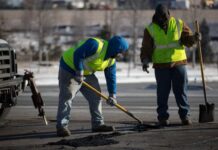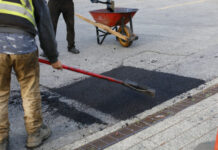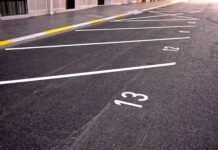The aesthetic appeal and longevity of an asphalt driveway depend significantly on the quality of maintenance it receives. Among the crucial steps in preserving and enhancing an asphalt driveway is the application of a high-quality asphalt driveway sealer. This guide is designed to help you navigate the process of selecting the best asphalt driveway sealer for your needs, ensuring optimal protection and durability. Throughout this guide, we will emphasize the importance of informed decision-making and recommend consulting with experts like Commonwealth Paving, located at 136 Outerloop, Louisville, Kentucky 40214, and reachable at +1 502 459 7283, for professional advice on asphalt driveway sealing.
- Understanding the Purpose of Asphalt Driveway Sealer:
Before delving into the selection process, it’s essential to understand the primary purpose of an asphalt driveway sealer. This protective coating serves as a barrier against harmful elements such as UV rays, water penetration, oil spills, and harsh weather conditions. A well-chosen sealer enhances the visual appeal of the driveway, prolongs its lifespan, and reduces the need for extensive repairs.
- Types of Asphalt Driveway Sealers:
There are different types of asphalt driveway sealers available in the market, each with its unique characteristics. The main types include:
- Coal Tar Sealers: Known for their durability and resistance to chemicals, coal tar sealers are effective in protecting against oil and gasoline stains. However, they have a distinct odor and may require more curing time.
- Asphalt Emulsion Sealers: Water-based and environmentally friendly, asphalt emulsion sealers offer ease of application and quicker drying times. They are ideal for residential use and provide a dark, matte finish.
- Acrylic Sealers: Acrylic sealers create a glossy finish and offer excellent UV protection. They are often used for decorative driveways but may require more frequent reapplication.
- Oil-Based Sealers: Oil-based sealers are known for their deep penetration and durability. They provide a rich, dark finish and are resistant to gasoline and oil stains.
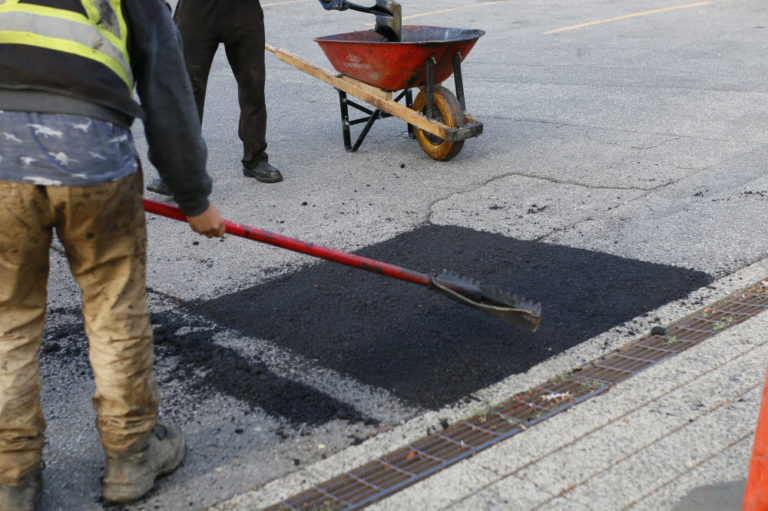
- Consider Your Driveway’s Age and Condition:
The age and current condition of your asphalt driveway play a crucial role in determining the type of sealer that will be most effective. For newer driveways, a lighter sealer with quicker curing times, such as asphalt emulsion, may be suitable. Older driveways or those with existing damage may benefit from the durability of coal tar or oil-based sealers.
- Climate Considerations:
The climate in your region should also influence your choice of asphalt driveway sealer. If you live in an area with harsh winters and frequent freeze-thaw cycles, it’s essential to select a sealer that provides effective protection against these weathering effects. Additionally, UV resistance becomes crucial in regions with intense sunlight.
- Application Method and Ease of Use:
Different sealers come with varying application methods, and ease of use is a critical factor, especially for DIY enthusiasts. Some sealers are spray-applied, while others may require brushes or rollers. Consider your comfort level with the application process and choose a sealer that aligns with your preferences and capabilities.
- VOC Content and Environmental Impact:
Volatile Organic Compounds (VOCs) are emissions that can contribute to air pollution and have environmental implications. When choosing an asphalt driveway sealer, consider the VOC content and opt for low-VOC or VOC-free formulations to minimize the environmental impact. Water-based sealers like asphalt emulsion typically have lower VOC content.
- Durability and Longevity:
The durability and longevity of the chosen asphalt driveway sealer are critical factors in assessing its effectiveness. Look for sealers with proven track records of resisting elements like UV rays, oil, and water for an extended period. Consider reviews and testimonials from other homeowners to gauge the performance of the sealer over time.
- Cost and Value for Money:
While cost is a significant consideration, it’s essential to view it in the context of value for money. Cheaper sealers may save you money upfront, but they might require more frequent reapplication or may not provide the same level of protection as higher-quality options. Evaluate the overall value and longevity the sealer offers in relation to its cost.
- Manufacturer Reputation:
The reputation of the manufacturer is a key indicator of the quality of an asphalt driveway sealer. Choose products from reputable manufacturers with a history of producing reliable and effective driveway sealers. Commonwealth Paving, as a trusted paving company, can provide recommendations based on their experience with various sealers in different scenarios.
- Customization and Appearance:
Consider whether you have specific preferences regarding the appearance of your driveway. Some sealers provide a glossy finish, while others offer a matte appearance. Understanding your aesthetic preferences will help you choose a sealer that enhances the visual appeal of your driveway.
- Resistance to Stains and Chemicals:
Driveways are exposed to various substances, including oil, gasoline, and other chemicals. A high-quality asphalt driveway sealer should offer resistance to stains and chemicals to maintain the pristine look of your driveway and prevent damage from spills.
- Consultation with Professionals:
When in doubt or if you have specific concerns about your driveway, consider consulting with professionals like Commonwealth Paving. Their expertise can provide valuable insights into the unique needs of your driveway, helping you make an informed decision on the best asphalt driveway sealer for your situation.
Choosing the best asphalt driveway sealer is a crucial step in preserving the beauty and structural integrity of your paved surface. Commonwealth Paving, located at 136 Outerloop, Louisville, Kentucky 40214, and reachable at +1 502 459 7283, stands as a reliable resource for expert advice and professional asphalt maintenance services. By considering factors such as sealer type, climate, application method, and environmental impact, you can make an informed decision that aligns with your driveway’s specific requirements. Investing in a high-quality sealer and following proper application guidelines will pave the way for a long-lasting and visually appealing driveway.
The Science of Asphalt Driveway Sealer and Preservation: Unveiling the Secrets to Long-Lasting Excellence
The process of preserving and enhancing the lifespan of an asphalt driveway involves a careful selection of materials and techniques. At the forefront of this maintenance strategy is the application of a high-quality asphalt driveway sealer. This guide aims to unravel the science behind asphalt driveway sealer and preservation, shedding light on the key principles that contribute to long-lasting excellence. As we delve into the intricacies of asphalt preservation, it is essential to recognize the expertise of professionals like Commonwealth Paving, located at 136 Outerloop, Louisville, Kentucky 40214, and reachable at +1 502 459 7283. Commonwealth Paving stands as a trusted partner in the science of asphalt preservation, offering insights, solutions, and expert services for homeowners and businesses alike.
- The Role of Asphalt Driveway Sealer:
At its core, the purpose of an asphalt driveway sealer is multifaceted. It serves as a protective barrier that shields the asphalt surface from the deleterious effects of external elements. These elements include UV rays, rain, snow, oil spills, and general wear and tear caused by vehicular traffic. The sealer acts as a resilient shield, preventing premature deterioration and enhancing the overall longevity of the asphalt.
- Understanding the Composition:
Asphalt driveway sealers are formulated with a carefully crafted blend of materials, each serving a specific purpose. The primary components include:
- Asphalt Emulsion: This water-based component provides the base for the sealer, allowing for easy application and quick drying. Asphalt emulsion sealers are known for their environmental friendliness and versatility.
- Fillers and Additives: Various fillers and additives are incorporated to enhance specific properties of the sealer. This may include substances to improve adhesion, flexibility, and resistance to chemicals.
- Polymers: Polymers are often included to impart elasticity and durability to the sealer. These additives contribute to the sealer’s ability to withstand temperature fluctuations and the stresses imposed by vehicular traffic.
- Solvents: In some formulations, solvents may be included to aid in the application and drying process. It is essential to choose sealers with low VOC (Volatile Organic Compounds) content to minimize environmental impact.
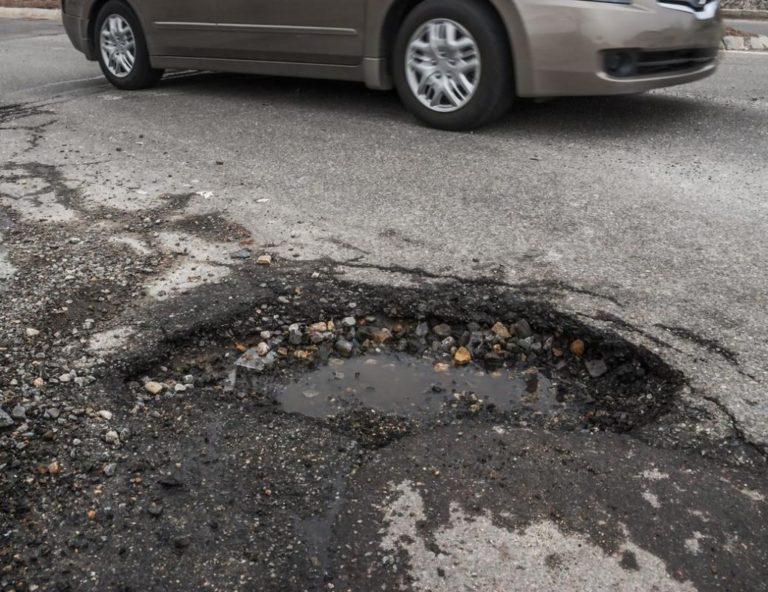
- The Science of Protection:
The protective qualities of asphalt driveway sealer are deeply rooted in scientific principles. UV rays from the sun can cause oxidation and degradation of the asphalt binder, leading to surface cracking and color fading. The sealer forms a protective barrier that reflects UV rays and prevents direct exposure to the asphalt surface. This protection not only maintains the visual appeal of the driveway but also inhibits structural damage caused by prolonged sun exposure.
- Waterproofing and Preventing Water Intrusion:
Water is a formidable adversary for asphalt surfaces. When water penetrates the asphalt, it can lead to a range of issues, including cracks, potholes, and the breakdown of the aggregate. The science of asphalt driveway sealer includes creating a waterproof barrier that prevents water from infiltrating the asphalt structure. This waterproofing not only safeguards the integrity of the driveway but also minimizes the risk of freeze-thaw cycles causing damage during colder seasons.
- Flexibility and Crack Prevention:
Asphalt surfaces are subjected to constant movement and stress, especially in regions with fluctuating temperatures. The inclusion of polymers in the sealer enhances its flexibility, allowing it to accommodate the natural expansion and contraction of the asphalt. This flexibility is crucial in preventing the formation of cracks and ensuring that the sealer remains intact even under the dynamic conditions of vehicular traffic and temperature variations.
- Adhesion to the Asphalt Surface:
The adhesion properties of the sealer determine its effectiveness in creating a durable bond with the asphalt surface. Proper adhesion ensures that the sealer forms a cohesive layer that adheres securely to the asphalt, providing consistent protection across the entire driveway. The science of adhesion involves selecting the right combination of materials and additives to achieve optimal bonding characteristics.
- Resistance to Chemicals and Oil Spills:
Driveways are exposed to various chemicals, including oil and gasoline spills. A high-quality asphalt driveway sealer incorporates components that create a barrier against these chemicals, preventing them from penetrating the asphalt and causing damage. This resistance to chemicals not only preserves the visual appearance of the driveway but also safeguards its structural integrity.
- Application Techniques and Precision:
The science of asphalt preservation extends beyond the composition of the sealer to the application techniques employed. Achieving uniform coverage, proper thickness, and precise application are critical factors in ensuring the sealer’s effectiveness. Commonwealth Paving’s expertise lies in the meticulous application of sealers, utilizing advanced techniques to guarantee consistent and optimal protection for each driveway.
- Environmental Considerations:
The science of asphalt preservation also takes into account environmental considerations. Opting for water-based sealers with low VOC content aligns with sustainable practices and minimizes the impact on air quality. Commonwealth Paving, committed to environmental responsibility, prioritizes the use of eco-friendly sealers that balance performance with ecological considerations.
- Monitoring and Maintenance:
Preserving an asphalt driveway is an ongoing process that requires monitoring and periodic maintenance. The science of preservation involves regular inspections to identify signs of wear, cracking, or other issues. Commonwealth Paving provides maintenance services that include reapplication of sealers as needed, ensuring continuous protection and longevity for your driveway.
- Tailored Solutions for Unique Needs:
Every asphalt driveway has unique characteristics, influenced by factors such as climate, traffic volume, and existing conditions. Commonwealth Paving’s scientific approach involves tailoring solutions to meet the specific needs of each driveway. This personalized strategy ensures that the chosen sealer and preservation techniques address the individual challenges faced by your asphalt surface.
- Advancements in Asphalt Preservation:
Staying at the forefront of industry advancements is crucial in the science of asphalt preservation. Commonwealth Paving embraces innovations in materials, techniques, and equipment to provide state-of-the-art solutions. The integration of cutting-edge technologies ensures that their preservation methods align with the latest industry standards, delivering optimal results for homeowners and businesses.
The science of asphalt driveway sealer and preservation is a comprehensive and dynamic field, encompassing the careful selection of materials, understanding the underlying principles of protection, and employing precise application techniques. Commonwealth Paving, located at 136 Outerloop, Louisville, Kentucky 40214, and reachable at +1 502 459 7283, embodies the expertise and commitment required to preserve the longevity and excellence of asphalt driveways. By delving into the science of asphalt preservation, homeowners and businesses can make informed decisions that pave the way for durable, visually appealing, and structurally sound driveways.
Tips for Applying Asphalt Driveway Sealer Like a Pro: Commonwealth Paving’s Expert Guide
Applying asphalt driveway sealer is a crucial step in preserving and enhancing the lifespan of your paved surface. When done correctly, it provides a protective shield against the elements, prevents deterioration, and contributes to the overall aesthetics of your driveway. To help you achieve professional results, this guide offers valuable tips for applying asphalt driveway sealer like a pro. As you embark on this maintenance journey, remember that expert advice and assistance are just a call away. Commonwealth Paving, located at 136 Outerloop, Louisville, Kentucky 40214, and reachable at +1 502 459 7283, stands ready to provide the guidance and services you need to ensure a successful driveway sealing project.
- Choose the Right Time for Sealing:
Timing is crucial when it comes to applying asphalt driveway sealer. Ideally, choose a day with favorable weather conditions. Avoid sealing your driveway on extremely hot or cold days, as extreme temperatures can affect the sealer’s application and drying process. Aim for a day with mild temperatures and minimal chances of rain to ensure optimal results.
- Clean and Prepare the Surface:
Proper preparation is key to a successful asphalt driveway sealer application. Thoroughly clean the surface to remove dirt, debris, and any existing stains. Use a broom or leaf blower to eliminate loose particles, and consider pressure washing for a deeper clean. Address any oil or grease stains with an appropriate cleaner to ensure the sealer adheres uniformly.
- Fill Cracks and Potholes:
Before applying the sealer, take the time to fill any existing cracks or potholes in your driveway. Use a quality asphalt patching material to level the surface. This step ensures a smooth and even application of the sealer, preventing it from settling unevenly and leaving vulnerable spots on the asphalt.
- Trim Grass and Vegetation:
Trimming grass and vegetation along the edges of your driveway is essential before applying the sealer. This not only provides a cleaner and more polished appearance but also prevents these elements from coming into contact with the sealer during the application process.

- Mask Off Non-Target Areas:
Protect adjacent surfaces and areas that you don’t want to be sealed by using masking tape or plastic sheeting. This includes concrete walkways, garage doors, and any other surfaces that could be accidentally coated with sealer. Taking the time to mask off these non-target areas ensures a neat and professional-looking finish.
- Wear Protective Gear:
Safety should be a top priority during the asphalt driveway sealer application process. Wear appropriate protective gear, including gloves, safety glasses, and clothing that covers exposed skin. If you’re using a sprayer for application, consider wearing a mask to protect against fumes. This precautionary measure ensures a safe and comfortable experience while working with the sealer.
- Stir the Sealer Thoroughly:
Before applying the asphalt driveway sealer, thoroughly stir the product to achieve a consistent and uniform mixture. Follow the manufacturer’s instructions for stirring and pay attention to any settling that may have occurred during storage. A well-stirred sealer ensures that all components are properly blended, enhancing its effectiveness.
- Choose the Right Application Method:
There are various methods for applying asphalt driveway sealer, including using a brush, roller, or sprayer. The choice of application method depends on factors such as the size of your driveway and personal preference. Brushes and rollers are suitable for smaller driveways, while sprayers are more efficient for larger surfaces. Commonwealth Paving’s experts can provide guidance on the most suitable application method for your specific needs.
- Work in Small Sections:
To achieve a consistent and professional finish, work on your driveway in small sections. Apply the sealer evenly, avoiding streaks and uneven coverage. This approach allows you to maintain control over the application process, ensuring that each section receives the attention it needs for optimal protection.
- Start at the Top and Work Downward:
When using a brush or roller, start at the top of your driveway and work downward. This ensures that any accidental drips or spills are incorporated into the application process as you move down the surface. This method helps avoid uneven pooling and streaking, resulting in a more polished appearance.
- Maintain a Wet Edge:
To prevent lap marks and achieve a seamless finish, maintain a wet edge while applying the sealer. Work quickly and methodically to overlap each pass slightly, ensuring that the sealer blends seamlessly across the entire surface. This technique requires continuous movement to avoid visible lines and uneven drying.
- Apply a Second Coat if Necessary:
In some cases, applying a second coat of asphalt driveway sealer may be necessary to achieve the desired level of protection. Consider factors such as the age and condition of your driveway, as well as the type of sealer used. Commonwealth Paving’s experts can offer insights into whether a second coat is recommended for your specific situation.
- Allow Adequate Drying Time:
After completing the application, allow the sealer to dry thoroughly before allowing any traffic on the driveway. Drying times can vary depending on the type of sealer and weather conditions. Follow the manufacturer’s recommendations for drying times, and avoid using the driveway until the sealer has cured completely.
- Consider Professional Assistance:
If you’re uncertain about the application process or have a large driveway that may benefit from professional expertise, consider seeking assistance from Commonwealth Paving. Their experienced team can handle the entire sealing process, ensuring a flawless finish and long-lasting protection for your asphalt driveway.
- Routine Maintenance for Longevity:
To extend the life of your driveway and maximize the benefits of asphalt driveway sealer, incorporate routine maintenance into your property care routine. Address any new cracks promptly, clean the surface periodically, and consider reapplying the sealer as needed. Commonwealth Paving can provide guidance on establishing a maintenance schedule tailored to your driveway’s specific requirements.
Applying asphalt driveway sealer like a pro requires careful planning, attention to detail, and adherence to best practices. By following these tips and considering the expert advice from Commonwealth Paving, located at 136 Outerloop, Louisville, Kentucky 40214, and reachable at +1 502 459 7283, you can achieve professional results that enhance the longevity and visual appeal of your driveway. Whether you choose to undertake the project yourself or enlist professional assistance, the key is to prioritize proper preparation, meticulous application, and ongoing maintenance for a driveway that stands the test of time.
Address
Commonwealth Paving, 136 Outerloop, Louisville, Kentucky 40214
Phone: 502-459-7283, Fax: 502-456-2678
Opening Hours
| Monday | 8:00 a.m. – 5:00 p.m. |
| Tuesday | 8:00 a.m. – 5:00 p.m. |
| Wednesday | 8:00 a.m. – 5:00 p.m. |
| Thursday | 8:00 a.m. – 5:00 p.m. |
| Friday | 8:00 a.m. – 5:00 p.m. |
| Saturday | Closed |
| Sunday | Closed |


